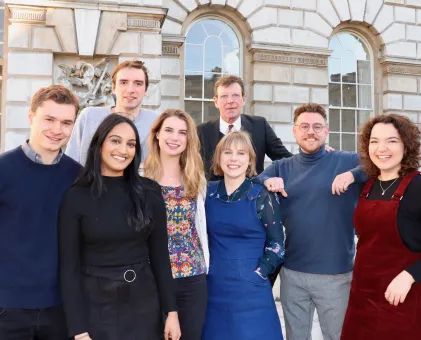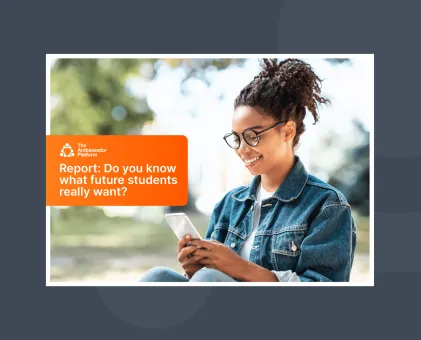How to improve dialogue between student recruitment and widening participation


If the first ‘s’ word you associate with Universities is ‘students’, the second might well be ‘silos’. At best, they’re a nuisance and at worst they can really hold you back. As such, you’ll struggle to find a Higher Education professional who doesn’t see a silo and want to smash it.
Of course, one of the most effective ways of breaking them down can be simply better dialogue between teams. Yes, talking to each other and sharing ideas! And, surely one of the most powerful pairings out there has to be student recruitment and widening participation.
For the rest of this blog, I’ll be discussing my research paper ‘Blurred Boundaries – Encouraging greater dialogue between Student Recruitment and Widening Participation’. The opportunity to produce this came through a WP writing course co-ordinated by Professor Jacqueline Stevenson (Sheffield Hallam University) on behalf of OFFA (Office for Fair Access) which started in November 2016.
The course offered WP practitioners the chance to produce a piece of academic research, which was somewhat ambitiously titled ‘Paper in a year’ launched and closed at Sheffield Hallam and during the course of 2017, colleagues took part in a number of tailored sessions to support the writing of papers. Full details of colleagues involved in the course and the topics covered are online.
One of the most challenging, yet enjoyable, aspects of the course was re-engaging in an academic piece of writing – in my case, it was a decade since I had done this! I think I speak for all participants in the course when I say that this was a huge challenge, perhaps bigger than I had anticipated, particularly when balanced alongside a busy and demanding day job.
This is perhaps reflected in the fact that only a limited number of papers have been published to date!
However, the opportunity to get the practitioner voice heard in the research community is necessary and I hope this course has acted as a catalyst for change in the sector moving forward connecting research, policy and practice.
My rationale for producing my paper was to ask:
How are universities structuring themselves to ensure they are meeting the dual aims of Student Recruitment and Widening Participation in a mass marketplace?
From my research, it is clear that SR and WP have always been intrinsically linked. As far back as The Robbins Report, the concept of widening access to HE to stimulate growth has been ingrained within governmental policy, and sectoral growth has been stimulated by widening access for students from poorer backgrounds.
In recognition of this, institutions are increasingly operating in a lifecycle context, in which colleagues from across an institution input into decisions regarding recruitment and WP.
This isn’t a new concept; a VC I interviewed commented “We were doing a student journey 15 years ago in our heads,” and whilst Liz Thomas’s ‘Understanding a whole institution approach to widening participation’ is gaining traction, as far back as 2002, Thomas had argued “WP is an institution-wide activity”.
When I interviewed Les Ebdon (Outgoing OFFA Director), he seemed excited by “the opportunity that the Office for Students (OfS )offers to bring about a step change in WP” and “we will have a whole regulator approach […] in which students will be at the centre of its thinking”.
Whilst it is going to take the time for OfS to gain traction, the presence of a single regulator is positive in that since OFFA and HEFCE’s Joint Strategy of 2014, the two organisations have seemed at odds, with Higher Education Funding Council for England (HEFCE)’s National Collaborative Outreach Progamme (NCOP) project contradicting OFFA on universities role in supporting attainment raising.
So, what did I discover? Well, my paper’s recommendations are listed below:
1. Greater standardisation across outreach
- The OfS will need to develop greater harmonisation across the sector. A uniform progression curriculum would be welcomed. The development of the newly established ‘What Works’ centre
- A commitment to impartial IAG should remain a component of WP policy, but collaboration should only occur when adding value to existing work.
- Future collaborative outreach should take heed of The Sutton Trust and focus on younger students (KS1 to KS3).
- With regards to Access Agreements, a shift away from arbitrary targets will be another requirement of the OfS.
2. Collaboration is crucial, but a change of focus is needed
3. We do need “a step change”, but it has to be effectively managed to become a reality
- Engagement with deprived communities needs to start earlier and be sustained throughout the lifecycle.
- Fixed term funding is unhelpful and engenders instability to the social mobility agenda, especially when projects come at the wrong stage of the student journey.
I’ve presented the paper at various conferences (Forum for Access & Continuing Education (FACE), Higher Education Liaison Officers Association (HELOA), National Educational Opportunities Network (NEON) and Society for Research into Higher Education) over the course of the past academic year and it has been great to see that the subject has provoked such passionate discussion.
The paper itself is set to be published in FACE’s next publication which will be available at their summer conference. If you would be interested in me speaking at your institution or just having a chat about the paper, please get in touch!
Lastly, I would like to thank all of my friends and colleagues across the sector for participating in focus groups, interviews and for their support and encouragement through the process. You are all boss!
At TAP, we’re passionate about widening participation and our platform can help your institution make a real difference. Want to find out more? Book a demo now!


